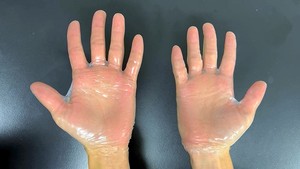By ARATA NAMIMA/ Staff Writer
January 1, 2020 at 07:00 JST
MASUDA, Shimane Prefecture--There's a new hound on the scene with a story that could rival that of the legendary Hachiko, the dog immortalized by a bronze statue in Tokyo's Shibuya district.
The canine now being feted was born in 1930 and called Ishi. Its claim to fame is that its bloodline is responsible for all living Shiba Inu dogs, estimated at 600,000 around the world.
Hachiko was a Japanese Akita Inu dog that died in 1935 and is revered across Japan for the loyalty it showed by waiting for its owner to return home each day for years after the man died.
A life-size granite statue of Ishi now stands beside the house where he was born. It stands about 60 centimeters tall and 70 cm long, and is mounted on a 60-cm-tall base.
A small memorial hall established next to the house displays photos of the dog, documentation of his pedigree and a history of Shiba Inu, a much-beloved breed native to Japan.
Another statue was erected at the Yumotokan inn in the Mito “onsen” hot spring resort, which is close to Ishi’s mountainous birthplace.
The pedigree certificate issued by the Japan Dog Preservation Society shows that Ishi was born in the village of Futakawa (present-day Mitocho district of Masuda) on Nov. 2, 1930.
According to Sekishuken Laboratory, a local group named after the indigenous breed from western Shimane Prefecture that has done a lot of research on Ishi, the dog was raised by a hunter named Nobuichi Shimoyama.
His grandson Hiroyuki Shimoyama, a 56-year-old construction carpenter, attended the unveiling ceremony of Ishi’s statue on Nov. 2 with about 40 local residents.
“After having left for Tokyo, Ishi has returned home as a stone statue with a soul,” Shimoyama said as he pledged to work with the community to pass down the statues and the memorial hall as “local treasures” for future generations.
According to researchers, a dog preservation society member from Shimane Prefecture who ran a dental clinic in Tokyo found Ishi in 1936. He brought the dog to Tokyo, where Ishi sired many offspring that led to the explosion of Shiba Inu today.
A local civic group called Nukumori no Sato Futakawa, which was established to revitalize the community in the face of its declining population, raised donations from residents and companies to produce the statue.
Its president, Takato Ushio, 69, learned in 2018 that Ishi’s birthplace was in the Futakawa district. He came up with the idea of creating a stone statue of Ishi based on the only existing photo of the dog. It shows Ishi from the side, standing proudly.
A local stonemason shunned the proposal on grounds the thin legs would not support the bulk of the stone statue.
In March last year, Ushio got hold of Yokohama resident Masahiro Kamitori, 72. He has produced at least 200 stone statues of dogs and agreed to create one of Ishi.
In April, Kamitori visited Masuda to gain a better sense of the place where Ishi was born. He contacted the dog preservation society's Shimane prefectural branch to get the lowdown on Ishi’s characteristics and the nature-rich environment in which he grew up.
“I created statues that are intended to last for 100 or even 1,000 years,” Kamitori said. “I dearly hope many people will visit the site.”
According to the dog preservation society, all Shiba Inu newly registered with the organization--slightly less than 30,000 a year--can trace their bloodlines back to Ishi.
“Ishi was muscular with a sturdy build. He looked strong when he stood and had wonderfully bristly fur,” said Atsuo Yanao, 81, head of the society’s Shimane branch.




















Stories about memories of cherry blossoms solicited from readers
Cooking experts, chefs and others involved in the field of food introduce their special recipes intertwined with their paths in life.
A series based on diplomatic documents declassified by Japan’s Foreign Ministry
A series on the death of a Japanese woman that sparked a debate about criminal justice policy in the United States
A series about Japanese-Americans and their memories of World War II
Here is a collection of first-hand accounts by “hibakusha” atomic bomb survivors.